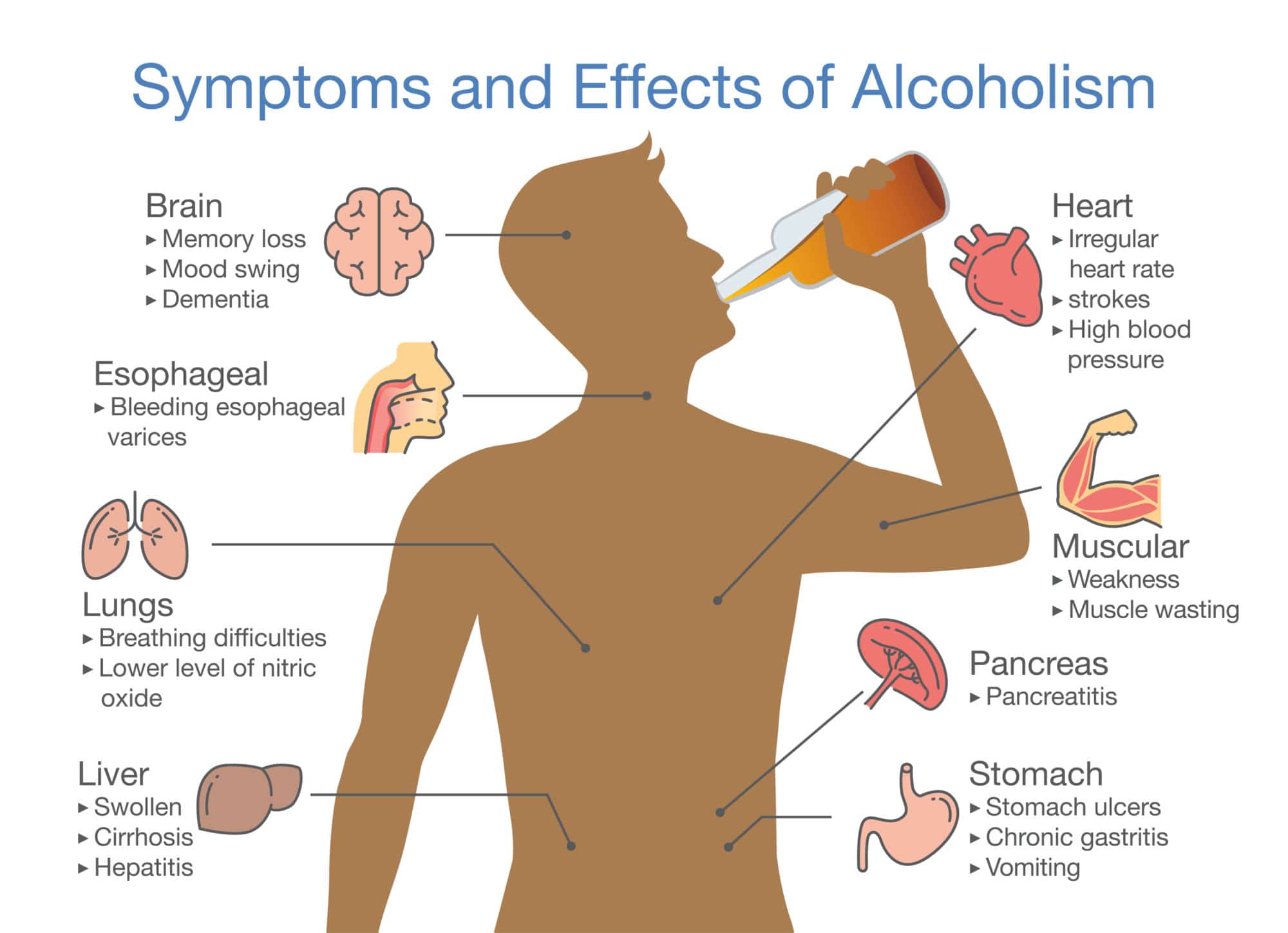Alcoholism is a disease that affects many people in the United States. Alcoholism can make someone very sick and could even lead to them getting cancer, liver disease, high blood pressure, depression, or anxiety disorders. In this article, I will show you how alcoholism causes problems in a person’s physical and mental well-being. It will also discuss ways to stop drinking alcohol so you could live a healthier life without it!
What Is Alcoholism?

Alcoholism is a disease that can affect one’s physical and mental health. It causes problems in the way someone looks, acts, thinks, or feels about themselves for many years. Alcoholism is also known as Alcohol Use Disorder (AUD).
What Are The Causes Of Alcoholism?

Although the reasons why alcoholism occurs are not fully understood, there appear to be both genetic and environmental factors that make someone more likely to become an alcoholic. It’s important to note that a person doesn’t have to inherit this disease from their parents – they can still become an alcoholic if they’re exposed to alcohol while growing up.
Environmental factors
- Eating habits: Some kids do not have parents that drink alcohol. Other kids have relatives that drink alcohol. Kids who are around parents or relatives who drink will also want to drink too. They will start believing that such activity is normal and acceptable.
- Peer pressure: People who drink alcohol are more likely to try it if they are around others who do, too. They might even have an addiction later down the road.
- Media: The media is a big influencer when it comes to people’s drinking habits. Celebrities and athletes drink alcohol. This might make someone want to do the same thing. They might end up drinking too much and developing an addiction.
Genetic factors
The genes that are passed down from parents to their children may make them more likely to become alcoholics. This doesn’t mean that a person will definitely become an alcoholic if they have these genes, but it does make it more likely.
How Alcoholism Affects The Body?

When a person drinks alcohol, the drink goes into their bloodstream and goes to every organ in their body. This includes the brain, liver, heart, and pancreas. Alcohol can affect your organs and makes them not work. This can lead to serious problems.
- The brain: When someone drinks alcohol, they feel happy and relaxed. This feeling of euphoria could lead to them drinking more in order to maintain that good mood. If a person keeps doing this over time, their body will develop an addiction and their brain will get used to alcohol. Too much use of a drug can cause someone to have depression later in life. They may also have a problem with anxiety.
- The liver: The main reason that people drink alcohol is so they can feel relaxed and happy. As mentioned above, when a person has an addiction, their liver might get damaged. A person who drinks too much could get cirrhosis or hepatitis. They could also develop liver cancer, which is a very serious disease that can lead to death.
- The heart: Drinking alcohol will make your body’s blood vessels open up. This means that the alcohol in your body can travel better. This might make someone feel great at first, but it can also lead to a heart attack.
- The pancreas: Alcohol affects the insulin levels in your body, which is produced by the pancreas. If the levels of sugar in the blood get out of balance and it gets too high, this can result in someone who drinks alcohol getting diabetes. They might not even know that they have diabetes because the early signs can be very mild.
Other Side Effects Of Alcoholism
People who are addicted to alcohol often experience a number of negative side effects. These can include:
- Weight loss or weight gain: Alcohol can cause people to lose weight because it suppresses their appetite. However, some people will gain weight because they drink too many high-calorie drinks.
- Internal damage: With long-term alcohol abuse, people can experience internal bleeding and even organ failure. In addition to that, drinking too much alcohol can cause cirrhosis or liver damage as well.
- Mood swings: People who are addicted to alcohol can often experience mood swings. They might go from being happy and carefree to feeling angry and agitated very quickly.
- Depression: Alcoholism can often lead to depression. People might feel like they are a burden to their loved ones or that life is not worth living anymore.
- Anxiety: People who are addicted to alcohol can feel anxious about many things. They might be nervous when they go out in public or have a panic attack because of work or school responsibilities.
- Sleep problems: People who are addicted to alcohol might have trouble sleeping at night, which can cause them to feel tired and irritable during the day.
- Insomnia: People might also drink alcohol to help them sleep. However, this can actually cause them to have problems sleeping in the long run.
- Headaches: People who are addicted to alcohol might start experiencing headaches. These can be caused by a number of different factors, including dehydration or withdrawal symptoms.
- Nausea and vomiting: Alcohol can often cause people to feel sick and vomit. This is because it irritates the stomach lining and makes it difficult for the body to absorb food.
These side effects can be very uncomfortable and they often make it difficult for people to function normally in their everyday lives.
Effects of Alcoholism on Family and Friends
People who are addicted to alcohol often have a negative impact on their friends and family members.
Their loved ones might feel like they are constantly walking on eggshells around them. Sometimes, people might not do the right thing. They might end up saying something that makes someone else upset.
This can make it very difficult for people to enjoy their time with a person who has a drinking problem.
Some people might feel like they have to clean up the mess when their loved ones get drunk or high on drugs. They might have to help them out when they get sick or even drive them home.
This can be very frustrating and it can make people feel like they are losing their patience and sense of self-worth.
Some people might even feel like they want to take care of themselves instead of taking care of someone else.
Ways To Stop Drinking Alcohol

If you feel like you might have a problem with alcohol, there are ways that you can seek help. You don’t have to suffer in silence – there is support out there for you!
- Talk to your doctor: If you think you may have a problem with alcohol, the first person you should talk to is your doctor. The doctor will ask you about drinking. They will look at your medical records. They can tell if it is an addiction or not.
- If they feel like you need treatment for alcoholism, there are several different options available: You can go to an inpatient clinic where you will stay for several days. You can go to a day treatment center that is open during the day and then come home at night. There are other outpatient clinics, too! You’ll have to attend therapy sessions or group counseling every week as part of your treatment plan. These therapies could help you with your addiction. You will also have to stop drinking alcohol completely. This can be tough, but it is very important that you do this in order to get better.
- Join a support group: There are many different types of support groups for people who are trying to overcome alcoholism. You can find these groups online or in your local community. They can be very helpful in keeping you on track and helping you to stay sober.
- Get help from a therapist: If you feel like you’re struggling to overcome your addiction, talking to a therapist could be the best option for you. A therapist will help you to understand why you drink alcohol and how to deal with your cravings. They can also provide you with coping strategies for when you’re feeling tempted to drink.
Alcoholism is a serious disease that can have negative consequences on your health if it’s not treated. It’s important to remember that you are not alone and there are many people who can help you get better.
Treatment Options For Alcoholism

If someone has a problem with alcohol, there are many different treatment options available to help them overcome their addiction.
There are several types of treatments for alcoholism. Each one is helpful in treating people in various ways:
- Some people might need an outpatient program where they attend therapy sessions or group counseling on a regular basis.
- Other individuals may benefit from residential treatment where they live at a treatment center for a period of time.
- There are also day treatment centers available that allow people to go home at night.
- Inpatient clinics and residential treatments can be very expensive, so many people choose outpatient programs instead.
- No matter what type of program someone chooses, it is important that they stop drinking alcohol completely.
- Before someone begins treatment, they need to make sure that it’s right for them and what type of program will be most beneficial.
- Some people might want a 12-step group where others who have overcome their addiction help those in the early stages of recovery. This kind of program can be very helpful because the individuals in the group understand what the person is going through.
- Others might prefer a program that uses medication to help them overcome their addiction. This type of program usually includes therapy sessions as well.
- There are also programs that use a combination of both 12-step groups and medications.
It’s important for people to find the right program for them. If they don’t, then treatment is unlikely to be effective and the individual could have a relapse in the future.
Medicines For Alcoholism

There are many different types of medicines that can help someone overcome their addiction to alcohol.
- One type of medicine is naltrexone. This medicine helps to reduce the craving for alcohol and it also blocks the effects of alcohol in the brain.
- Another type of medication is acamprosate. This drug prevents cravings and works well in combination with naltrexone.
- Antabuse is another type of medicine that people use to overcome their addiction. This drug makes people get sick if they drink alcohol while taking it. It is very helpful when someone wants to stop drinking.
- Other medicines include disulfiram or topiramate.
It’s important for people to talk to their doctor about the different types of medicines available and which one would be best for them.
Therapy Options For Alcoholism

There are many different types of therapy available for those struggling with alcoholism. Some common therapies include cognitive-behavioral therapy, motivational enhancement therapy, and 12-step facilitation therapy.
- Cognitive-behavioral therapy: This type of therapy helps people learn how to change their thoughts and behaviors related to drinking.
- Motivational enhancement therapy: This type of therapy helps people set goals and develop a plan to reach those goals.
- 12-step facilitation therapy: This is an approach that combines elements from the 12 steps in Alcoholics Anonymous with cognitive-behavioral strategies. A focus of this type of treatment is on helping people stay away from alcohol. This might include teaching them how to handle cravings and make a plan for things they need to do when they are not drinking. Treatment can also help people build a “sober” support system, which means other people who don’t drink alcohol.
In addition to these three types of therapy, there are other treatment options available for those struggling with alcoholism including Alcoholics Anonymous (AA), self-help groups such as LifeRing Secular Recovery or Rational Recovery, individualized cognitive behavioral therapy programs, medication, rehabilitation programs, and support groups.
Helping Someone Who Is Suffering From Alcoholism

There are a number of different ways that people can help someone who is suffering from alcoholism.
The most important thing is to be supportive and understanding. It is important to listen when someone wants to talk about their problems. It is important to help them in any way you can.
People with drinking problems might need help to stop drinking. They might need to learn about treatment options, too. It is important for them to find someone who understands what they are going through.
Some people might feel uncomfortable talking about alcoholism, so it is important that they find a way to open up. They might want to try writing down their thoughts or talking to someone they trust.
It is also important for people to take care of themselves. They should make sure they are getting enough sleep and eating healthy foods. They should also take some time for themselves to relax and de-stress.
Conclusion
Alcohol is a depressant. It slows down the central nervous system, which means it affects your moods as well as motor skills. The liver breaks down alcohol to form acetaldehyde, then acetic acid. The liver also releases water and carbon dioxide that the alcohol has turned into. Unlike most other substances, this one has to go all around your body. It goes through an enzyme called alcohol dehydrogenase. Your lungs break it down too – so you can actually breathe out some of what you drank! If someone drinks alcohol and does not fill their stomach, they might get sick. They will vomit.
A Word From Therapy Mantra
Your mental health — Your psychological, emotional, and social well-being — has an impact on every aspect of your life. Positive mental health essentially allows you to effectively deal with life’s everyday challenges.
At TherapyMantra, we have a team of therapists who provide affordable online therapy to assist you with issues such as depression, anxiety, stress, workplace Issues, addiction, relationship, OCD, LGBTQ, and PTSD. You can book a free therapy or download our free Android or iOS app.


